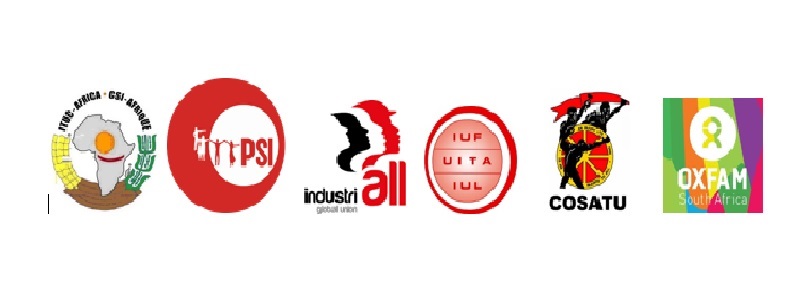
Trade Unions and Civil Society Organizations (CSOs) in South Africa met in Johannesburg on the 09th – 10th May 2017, under the theme “Curbing illicit financial flows for public sector development and public service delivery: The role of trade unions and civil society”.
The meetings focal point was to deal with the challenges caused by illicit financial flows out of the South African Economy, develop action plans on Tax Justice and clear demands to government.
The meeting further identified that;
1. There are reports and institutions including the UN High Level Panel on Illicit Financial flows (chaired by former South Africa president Thabo Mbeki), the South African Revenue Authority (SARS) that concede that South Africa is among the topmost African countries where illicit financial flows to western destinations is high.
Per Mbeki’s report South Africa is ranked third amongst 10 African countries, in terms of the cumulative illicit financial flows from 1970 to 2008. Within that period, $81.8 billion was lost to the economy. The South African Revenue Services (SARS) estimate that about R 30 billion of tax, which could be equated to 45% of government revenue is lost mainly through tax evasion by both individuals and companies.
2. According to the United Nation Conference on Trade and Development (UNCTAD) report, iron core and gold exports from South Africa exhibit systematic under-invoicing. Per South African data, the top partner, India accounts for only 4.6% of its total gold exports. However, data in India show a share of 35%.
3. Business relations between the government and multinational companies operating in the country are shrouded in secrecy. Information on their ownership, their tax waivers allocated and benefits of such relations to the economy are not readily available.
The secrecy prevents or denies the citizens the right to information or knowledge on what business the government is engaged in and their direct impact on citizens.
Considering the above concerns, the meeting recommends:
i. That the Minister of Finance and Commissioner of South African Revenue Service (SARS) must implement the various tax reform recommendations of the Davis Tax Committee, as the recommendations are inclusive of the inputs made by all stakeholders and are inimical to addressing some of the issues raised above.
ii. That government must seek to mobilize adequate funds domestically to fund public services and social protection. These are sustainable means of ending poverty and inequalities in South Africa.
iii. That in support and contribution to the global call for country-by country reporting for multinational companies, South Africa must ensure that local tax laws align to this call.
iv. That the South African government should release annual reports to parliaments on tax breaks and other incentives given to companies, what they are worth and what the company has promised in return. This should include tax treaties with countries.
v. That within the mandate of the south African Revenue Authority and the regulations governing revenue collection, government should increase resources and training to tax collection agencies to provide sufficient capacity to make Multinational companies pay their fair share of taxes.
vi. The call for the end to illicit financial flows is only one aspect in relation to the call for structural transformation of the South African economy. Most importantly, multinational companies must be committed, through government legislation and enforcement, to making sure that resources are allocated to developing the needed skills and capacities that allows for control and management of the country’s resources and the industrialization process.
Issued by: Participating PSI Trade Unions and Civil Society Organizations (CSOs) in South Africa
The Democratic Nursing Organization of South Africa (DENOSA)
National Education, Health and Allied Workers Union (NEHAWU)
South African Municipal Workers Union (SAMWU)
National Public Service Workers Union (NPSWU]
National Union of Public Service and Allied Workers (NUPSAW)
Economic Justice Network, South Africa
Oxfam South Africa
PSI Young Workers, South Africa
IUF
IndustriALL
ITUC-Africa
COSATU
Contacts:
Percy Masuku
Designation: Projects Coordinator, Southern Africa, PSI.
Mobile: +27791622868/26825057621
